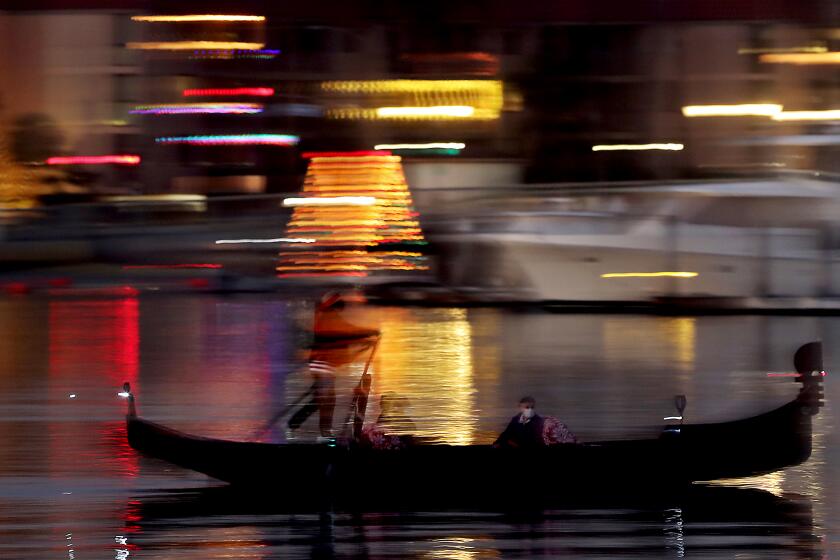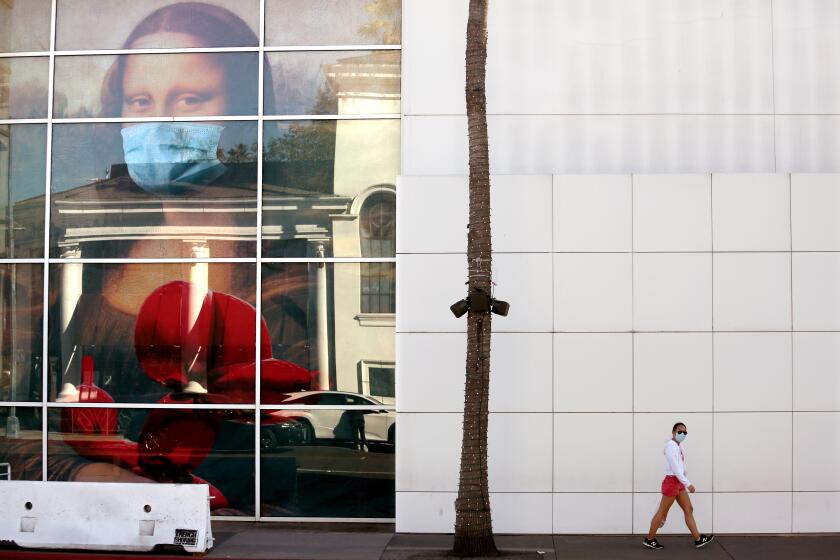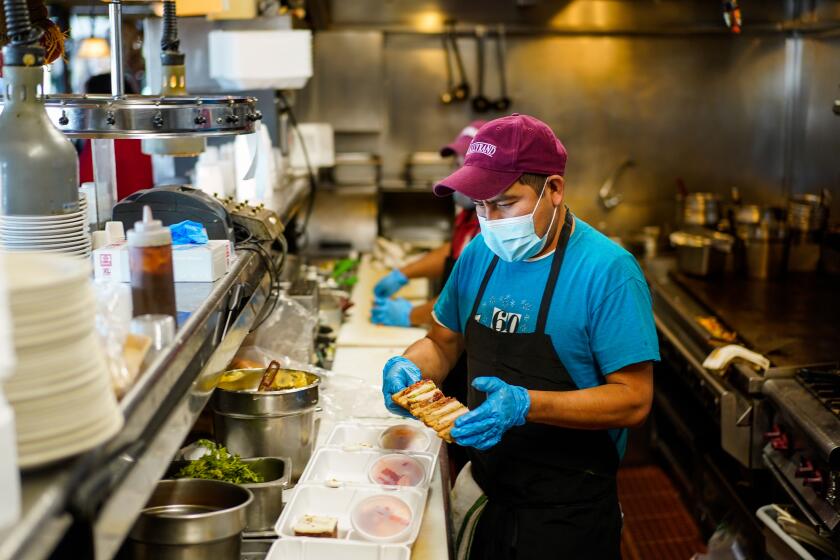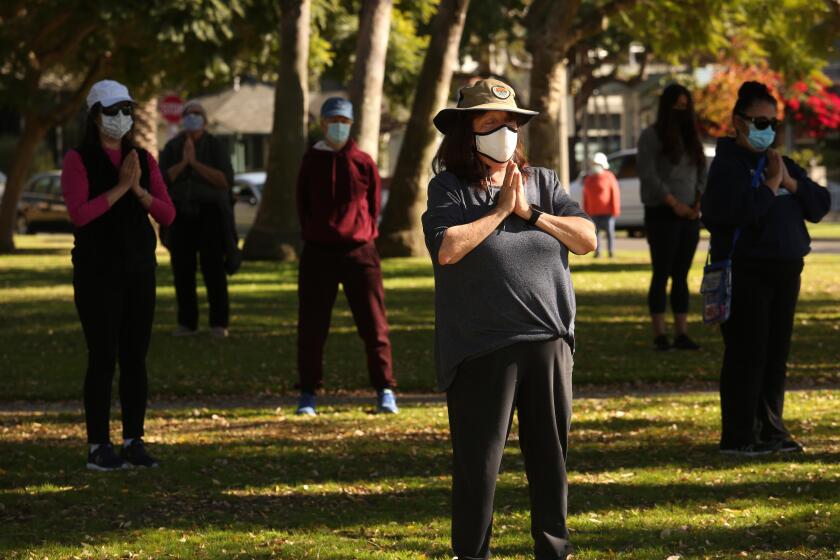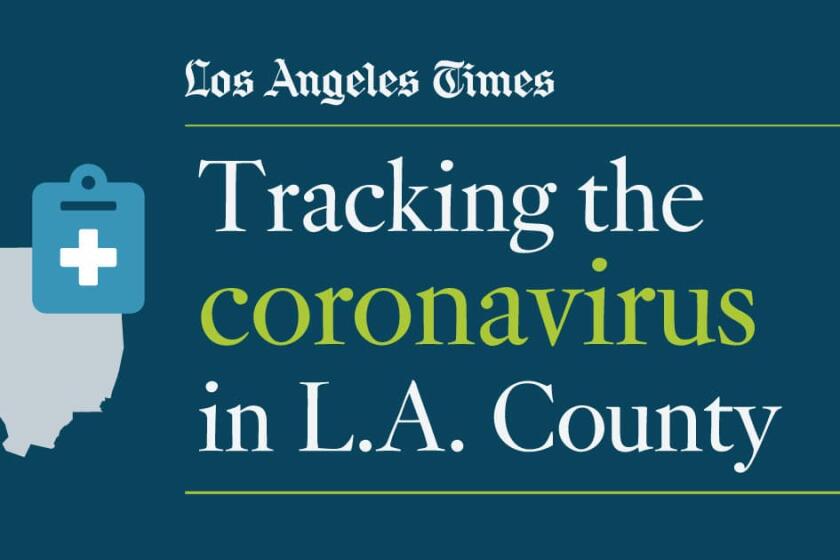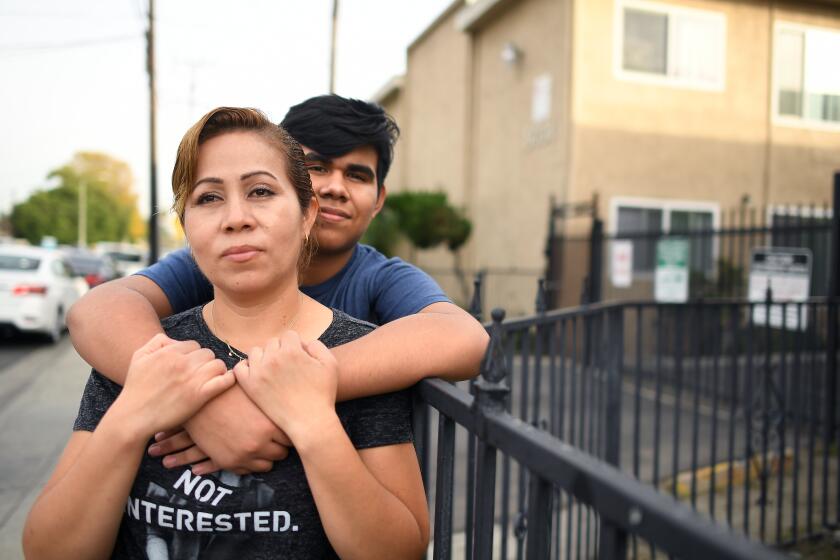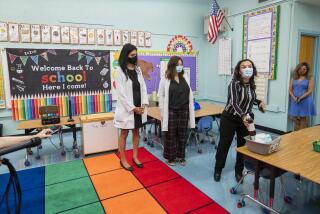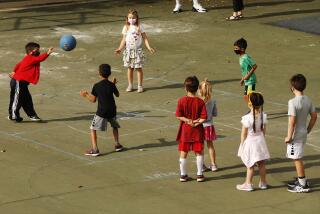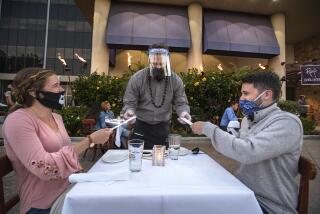Angry parents won’t let officials slide over closed playgrounds, packed malls
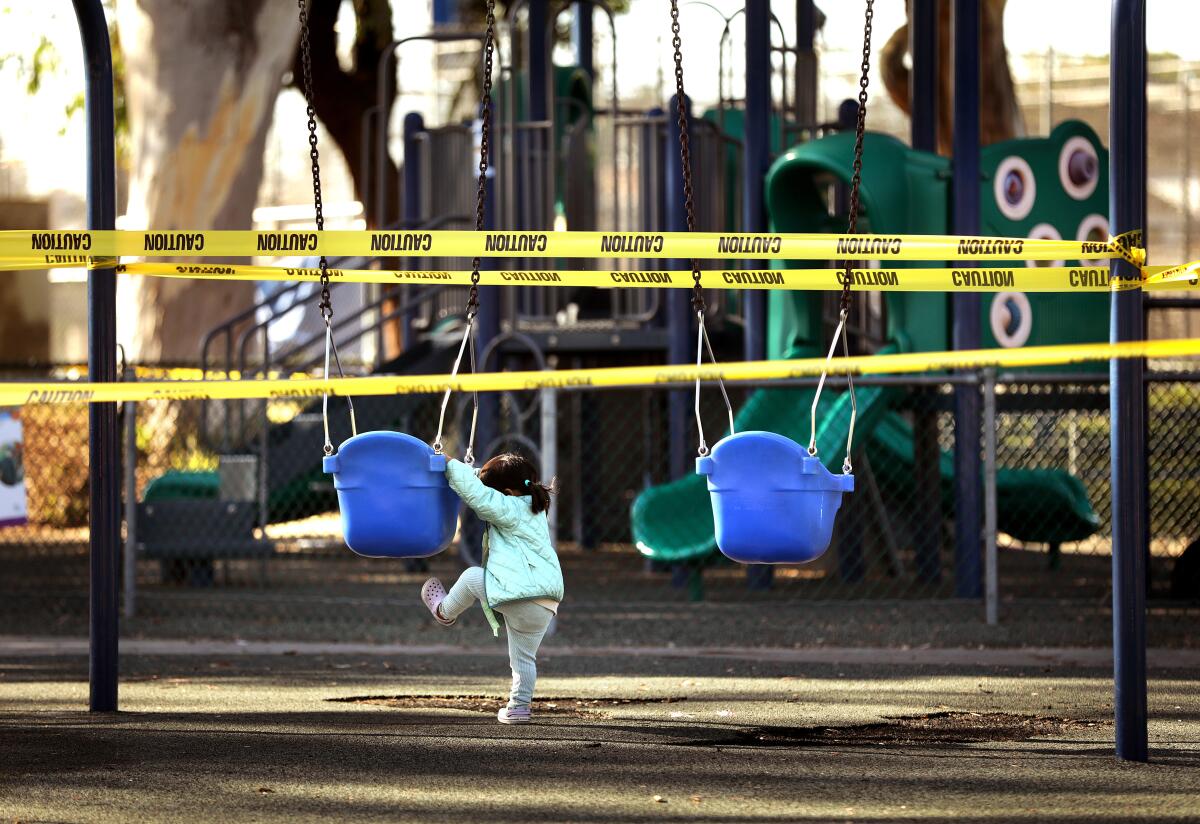
- Share via
Sydney Beckman ran beneath the yellow caution tape surrounding the empty playground equipment and flopped her tiny body over a swing.
The 2-year-old had tried opening a gate blocking the big green slide at Anderson Park in Redondo Beach, but her dad had tugged her away — trying to explain that the playground was closed. They would, he joked, have to sneak back “under cover of darkness.”
“Look at her! She looks so sad,” Zachary Beckman said, laughing at her small act of defiance.
Gov. Gavin Newsom has announced a stay-at-home order affecting most of California.
But the transformation of the playground into a no-fun zone angered the 38-year-old father in a way that belied his laughter.
Los Angeles County closed outdoor public playgrounds this week as part of a set of restrictions meant to slow an unprecedented surge in coronavirus cases. To many parents confounded by an array of official dictates — playgrounds and in-person schooling closed but malls open for business and packed with shoppers — a line in the sandbox has been crossed.
“Parents are really taking the brunt of all this,” Beckman said. “I understand the need for safety, but the inconsistencies and lack of logic is very frustrating.”
A few feet away, three adults played on the tennis court, which remains open. None wore masks.
Nine weary months in, many Californians have entered the “why-is-this-closed-while-that-is-open” stage of the pandemic.
State officials are considering the kind of stay-at-home order that helped curb the virus’ spread in the spring. What is unclear is whether Californians will stomach even a modified lockdown as they did in March and April.
And as new restrictions take effect, those who have followed the rules say they are having an increasingly hard time taking orders from politicians who don’t always seem to heed their own advice.
Angry parents pointed to Gov. Gavin Newsom’s attendance at a birthday dinner at the French Laundry in Napa Valley, even as he was warning against Thanksgiving dinner gatherings; L.A. County Supervisor Sheila Kuehl dining out in Santa Monica hours after voting last week to uphold a ban on outdoor dining; and state lawmakers flying to Hawaii last month to schmooze with interest groups while health officials were discouraging travel.
“The economic disparities of how they’re enforcing the rules is just obscene,” Beckman said “It’s clear that California is being run by the wealthy, not people with families. They opened up bars before playgrounds — how is that?”
Many fume over the county’s decisions to close outdoor public playgrounds and ban outdoor dining while allowing a slew of indoor businesses to stay open at reduced capacity — including shopping malls, tattoo and massage parlors and hair salons.
Los Angeles issued a modified stay-at-home order Wednesday night mirroring new L.A. County rules. “Just be smart and stay apart,” Mayor Garcetti said.
While children’s jungle gyms and monkey bars have been deemed too dangerous, tennis courts, golf courses, beaches, skate parks and hiking trails are still open. So too are outdoor gym classes with sweaty adults.
Playgrounds have emerged as focal points of the anger. The county has not publicly linked coronavirus outbreaks to playgrounds, which closed in March and did not reopen until the first week of October. Playgrounds at schools and day-cares remain open.
“I know the playgrounds have been, really for many, sort of not well understood, and [their closure] creates a lot of hardship again for families,” Los Angeles County Public Health Director Barbara Ferrer acknowledged this week.
The new rules, affecting stores, playgrounds and gatherings, are less severe than the stay-at-home order initiated in the spring.
Margaret Foss, who walks at the Van Nuys-Sherman Oaks Recreation Center several times a week, said the park is always crowded with adult exercise classes and people playing soccer and basketball, with few masks in sight.
“They’re closing restaurants but letting people hang out publicly without safeguards?” she said. “Soccer is a contact sport. Basketball is a contact sport. It’s bizarre.”
The new restrictions come as officials scramble to contain a surge in COVID-19 cases during the holiday season that has renewed fears about how the state’s healthcare system will handle a crush of new patients.
Still, the rules are not as severe as they were early in the pandemic, when nonessential businesses were closed — along with hiking trails and beaches.
Ferrer said that before issuing the latest regulations, health officials “went back and forth for many days” about how to handle reports from local parks departments about crowding, children playing without masks and the difficulty of sanitizing playground equipment.
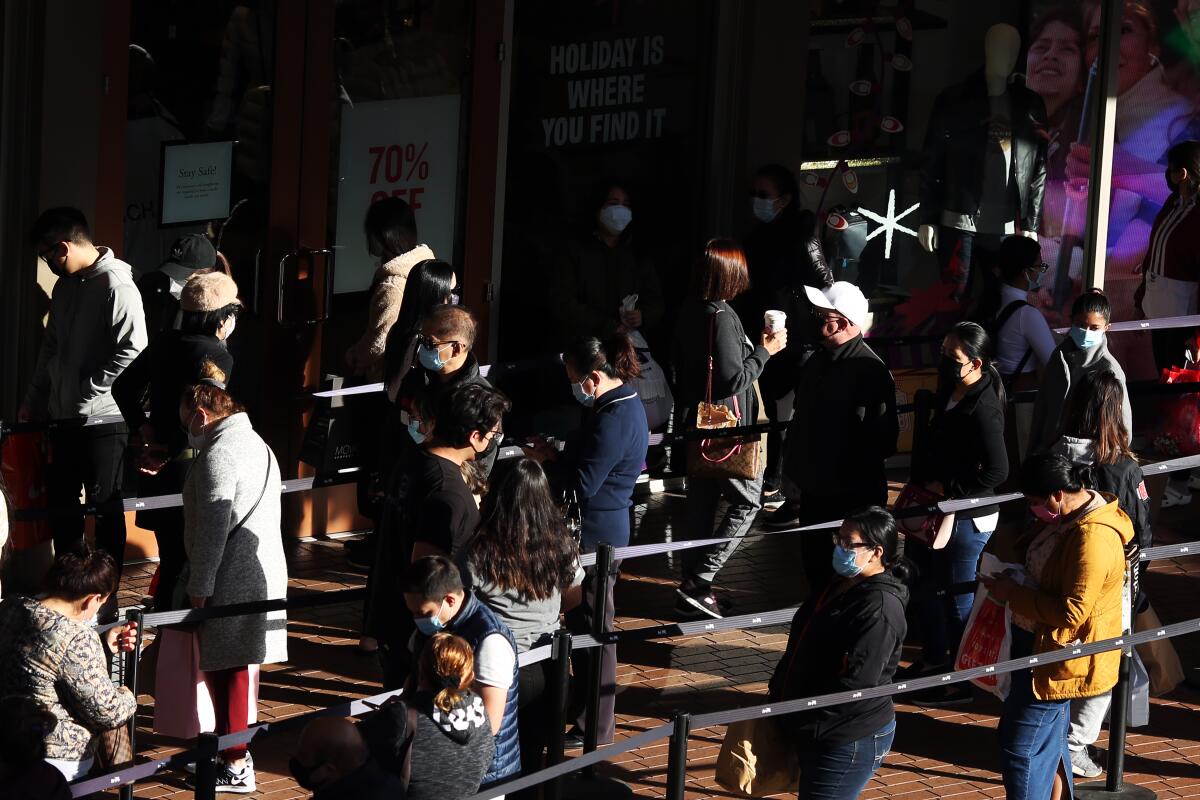
Tara Kirk Sell, a researcher at the Johns Hopkins Center for Health Security who has focused on risk communication and misinformation during the pandemic, said health officials must “be prepared for a good answer for why each of these measures should be put in place” and the science behind it.
“When there are too many restrictions and the public can’t understand and see the reason, it can make them stop listening altogether,” Sell said. “Trust — once it’s gone, it’s gone for good. Public health is really going to have to communicate well the next few months as we roll out vaccines.”
As for closing playgrounds, she said, officials have to remember that parents and children “need some sort of outlet.”
The latest maps and charts on the spread of COVID-19 in Los Angeles County, including cases, deaths, closures and restrictions.
In a phone interview, Sell’s children, ages 4 and 6, could be heard playing in the background. She and her husband both work from home in Baltimore now, and the children attend school virtually. They don’t have a yard, so they go to a playground every day, in masks, to get them away from their screens.
In mid-September, two dozen lawmakers pressed Newsom in a letter to reopen public playgrounds, decrying their “indefinite closure” and the disproportionate harm to low-income communities with few yards. They reopened two weeks later.
At the Earvin “Magic” Johnson Recreation Area in South L.A. this week, Oswaldo Romero entertained his 2-year-old daughter, Valeria, with a skateboard and chased her in the grass. Romero, 25, who lives in Watts and drives overnight for Lyft, said he has no yard and was frustrated that both public playgrounds and the ones at McDonald’s were closed.
“I need a place to take my kid,” he said. “She’s active. She needs to play.”
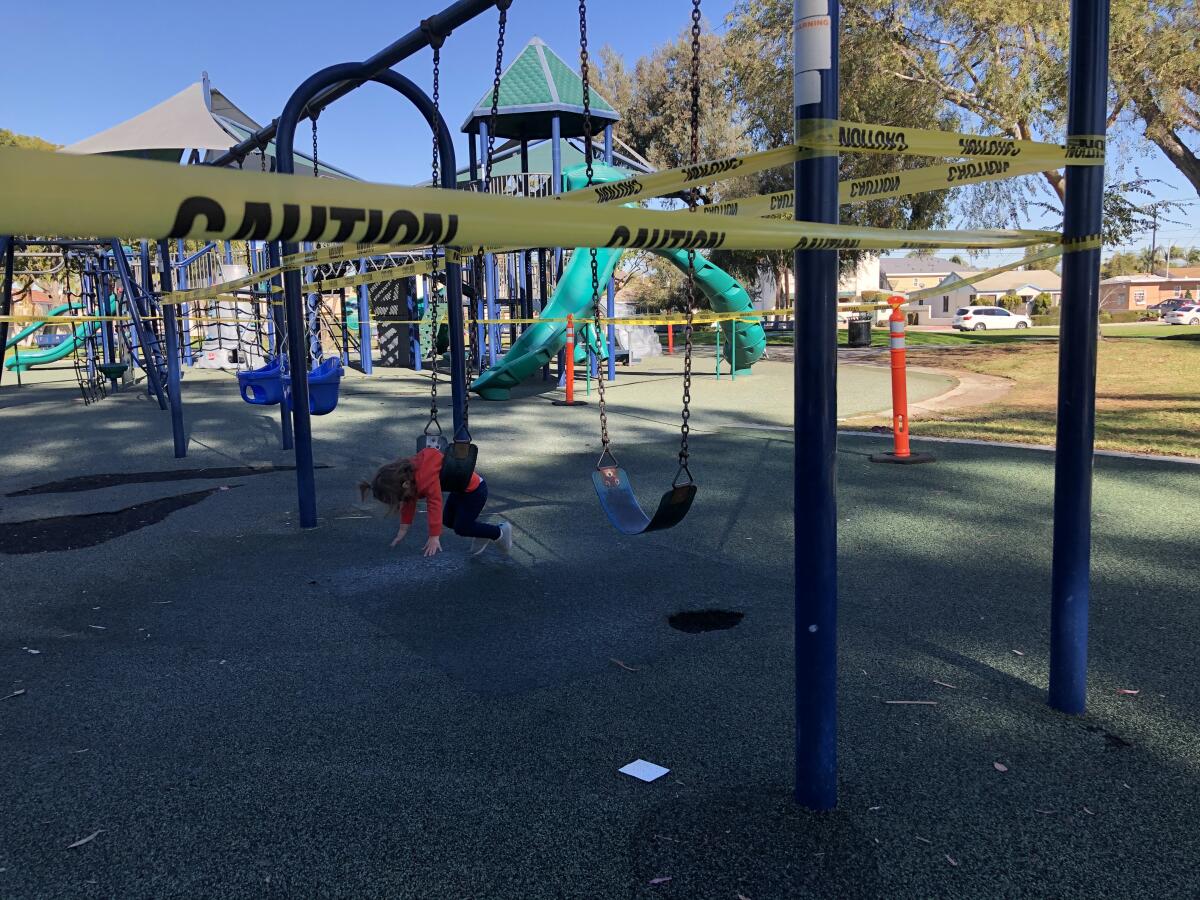
Oswaldo said his wife’s aunt got sick with COVID-19 earlier this year but recovered after two weeks. While he said he understands concerns about the virus, he thinks officials are “overdoing it with the safety measures” and that “there’s no reason to keep areas for kids closed.”
A 37-year-old sales associate at Westfield Santa Anita in Arcadia said she has been saddened to see a lot of children at the mall. The woman, who spoke on the condition of anonymity because she feared losing her job, said the mall seemed to far exceed the 25% capacity it was allowed (until this week, when that capacity was reduced to 20%), and that she has tried to contact the county health department about it. She worked Black Friday; the parking lot was full.
“It just makes no sense,” she said. “You shut down the parks, where it’s outside, but you want to keep malls open indoors? If you want to open the malls and allow people to shop, open up the schools. ... It’s all about money.”
Stores limit customers, but corridors are jammed with people in long lines. Tables and chairs are gone, but people stand around to eat and drink with no masks.
In Highland Park, Laura Mannino, a 41-year-old television writer, has had a hard time explaining to her 5-year-old son why he was seeing “police tape covering a space where he attended birthday parties and where he went every day.”
A school district survey asks parents in L.A. to look ahead to the near but indefinite future, when campuses could reopen for in-person classes, even as health officials project dark weeks ahead.
Harry, who attends LAUSD kindergarten virtually, thought the coronavirus lived only on playground equipment because that was the only thing he saw roped off. When his favorite playground finally reopened, he did just fine with his mom’s new rules: Wear a mask. Sanitize your hands before and after playing. Don’t crowd in the tube slide with other kids.
“If our state and city and county can put together massive testing sites and programs, certainly we can do basic information on playground safety messaging,” Mannino said. “People say playgrounds are high-touch areas. Then clean the playgrounds. Produce at the store is high-touch; we don’t see the county putting police tape around the melons.”
In her Facebook group for moms, parents have vented their fury over recent decisions.
“We’re conscientious,” Mannino said. “We follow the rules. But I’m seeing more and more parents frustrated. They’re taking it personally because we’re really exhausted.”
Echoing the tone of other parents in interviews this week, she added: “Let my kid swing on a f— swing.”
More to Read
Sign up for Essential California
The most important California stories and recommendations in your inbox every morning.
You may occasionally receive promotional content from the Los Angeles Times.
